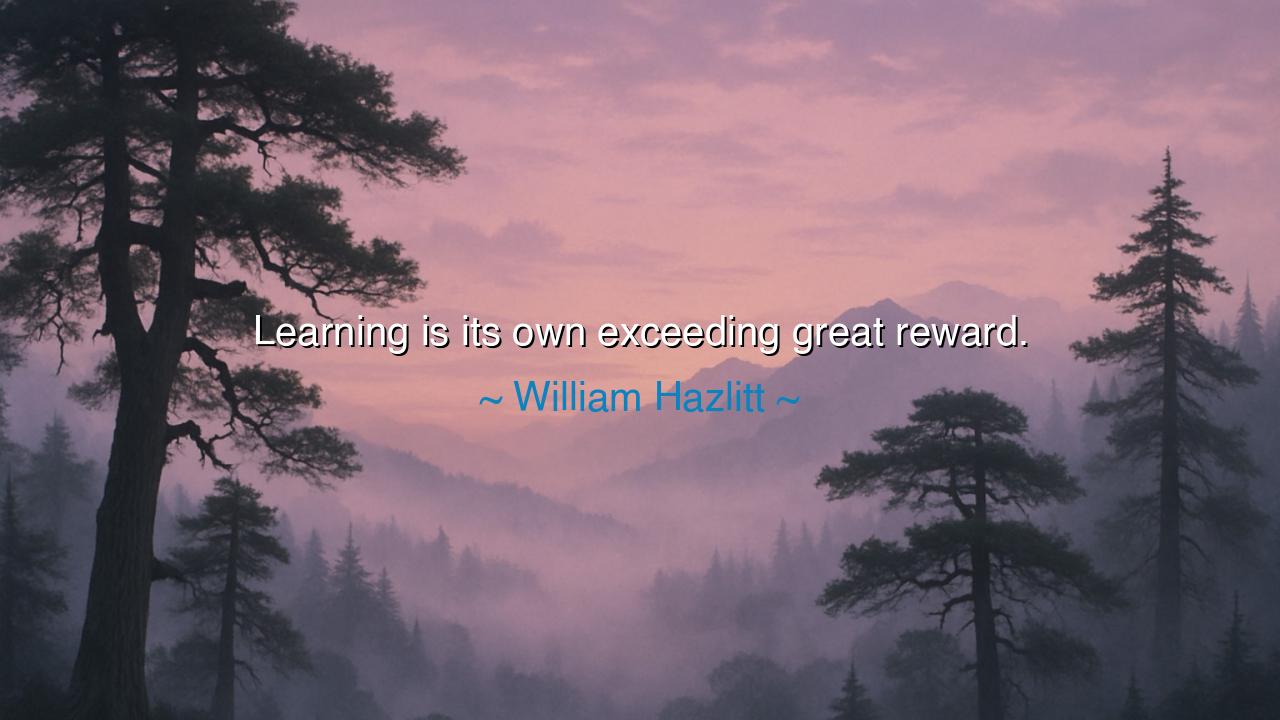
Learning is its own exceeding great reward.






In the golden age of English letters, William Hazlitt declared with quiet grandeur, “Learning is its own exceeding great reward.” At first glance, this seems a simple affirmation of the scholar’s joy. Yet hidden within these few words lies a truth vast and luminous—a truth known to philosophers, artists, and seekers since the dawn of reason. Hazlitt’s declaration speaks not only of knowledge, but of the soul’s hunger for illumination. For what he teaches is this: that to learn is not merely to gather facts or triumph in exams, but to awaken the spirit—to stand in wonder before the infinite, and find joy not in possession, but in pursuit.
The origin of this quote emerges from Hazlitt’s life as a critic, essayist, and lover of thought. He lived in the early nineteenth century, an age of revolution and awakening, when the mind of Europe struggled between old certainties and new discoveries. Hazlitt himself was no ivory-tower scholar; he was a man of passion, often poor, often misunderstood, but unyielding in his devotion to truth and art. To him, learning was not an ornament of the privileged, but the birthright of every thinking soul. When he called it its own “exceeding great reward,” he spoke as one who had tasted the quiet ecstasy of understanding—who knew that the act of discovery is itself a form of freedom, a fire that feeds the heart even when the world grows cold.
The ancients would have nodded in agreement. Aristotle, tutor to kings and philosopher of the ages, once said that all men by nature desire to know. In that desire, he found not greed, but grace—the longing that sets man apart from the beasts. The ancient schools of Athens and Alexandria, where sages debated beneath marble colonnades, were not marketplaces for power or wealth, but sanctuaries for the soul. They understood, as Hazlitt did centuries later, that the true reward of learning is not what it earns, but what it awakens: wisdom, humility, and the quiet joy of comprehension. For knowledge, once kindled, never truly fades—it becomes light carried from generation to generation, illuminating paths unseen.
Consider the story of Galileo Galilei, who, gazing through his telescope, beheld moons circling Jupiter—a revelation that defied all teaching of his time. He gained no riches from this discovery, only persecution and isolation. Yet in his writings, one senses not despair, but wonder. He had touched the fabric of truth itself, and that was enough. Like Hazlitt, he knew that learning’s reward is inward, not outward—that even when the world punishes, the mind that has seen truth cannot regret the seeing. His joy, though quiet, was eternal.
Hazlitt’s insight also strikes at the heart of modern restlessness. Too often do men and women pursue education for rank, wealth, or applause—seeking the reward before the wisdom, the crown before the climb. They forget that learning, when done for external gain, becomes labor; but when done for its own sake, it becomes liberation. The student who studies for curiosity learns deeply; the one who studies for approval learns only to imitate. Hazlitt’s words remind us that the pure joy of learning—the sudden spark of understanding, the widening of perspective—is itself life’s most precious treasure, beyond any coin or crown.
And yet, this joy is not without discipline. To learn is to be humbled, to confront one’s own ignorance again and again. But this humility is holy, for it is the path by which pride dissolves and wisdom is born. The reward Hazlitt speaks of is not comfort, but transformation. Each time the mind opens to a new truth, the world itself grows larger, and the heart grows more capable of wonder. The poet, the scientist, the craftsman—all are students of existence, forever learning, forever rewarded by the sheer act of discovery.
Let this then be the lesson for all who seek knowledge: pursue learning not as a ladder to climb, but as a horizon to chase. Read not to boast, but to awaken. Question boldly, observe humbly, and cherish the long journey of understanding. For every truth discovered is a seed of light, and every act of learning a quiet defiance against the darkness of ignorance.
So remember, children of thought and time: the reward for learning is not in what it brings you, but in what it makes of you. To learn is to grow, to see, to live more fully. As William Hazlitt reminds us, the mind that learns for love of truth becomes inexhaustible—rich beyond measure, even in poverty. For while fame fades and fortune turns, the joy of knowledge endures forever—a flame that neither age nor death can extinguish, burning ever brighter in the temple of the soul.






AAdministratorAdministrator
Welcome, honored guests. Please leave a comment, we will respond soon